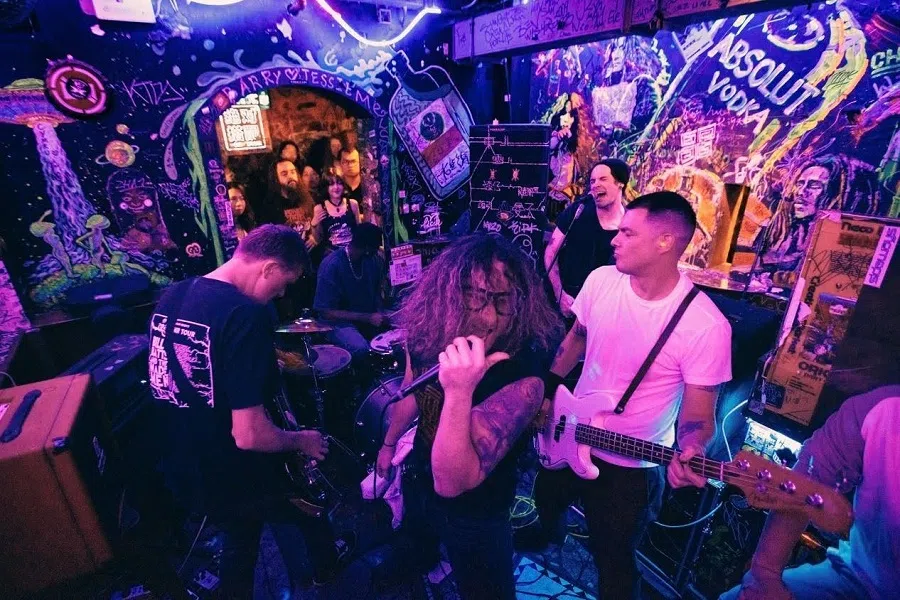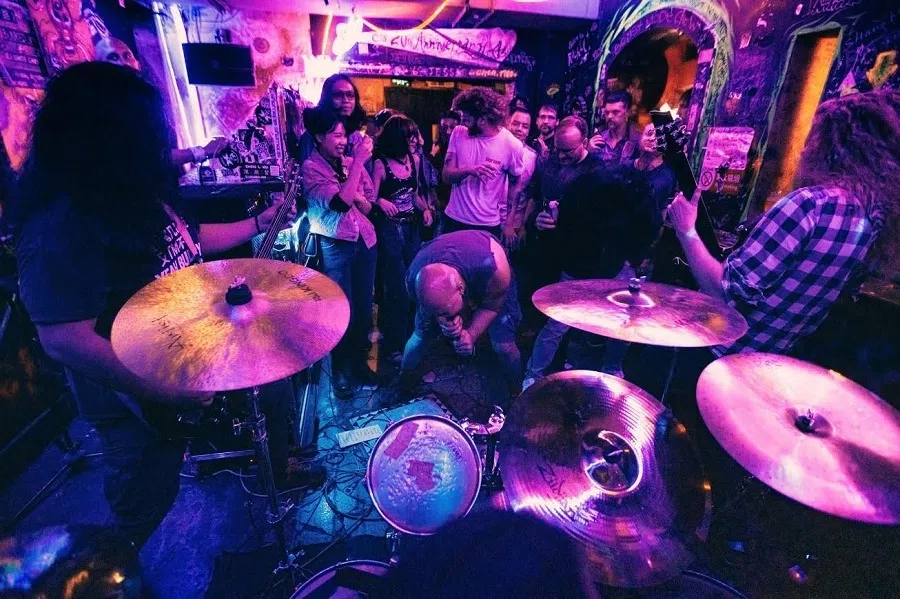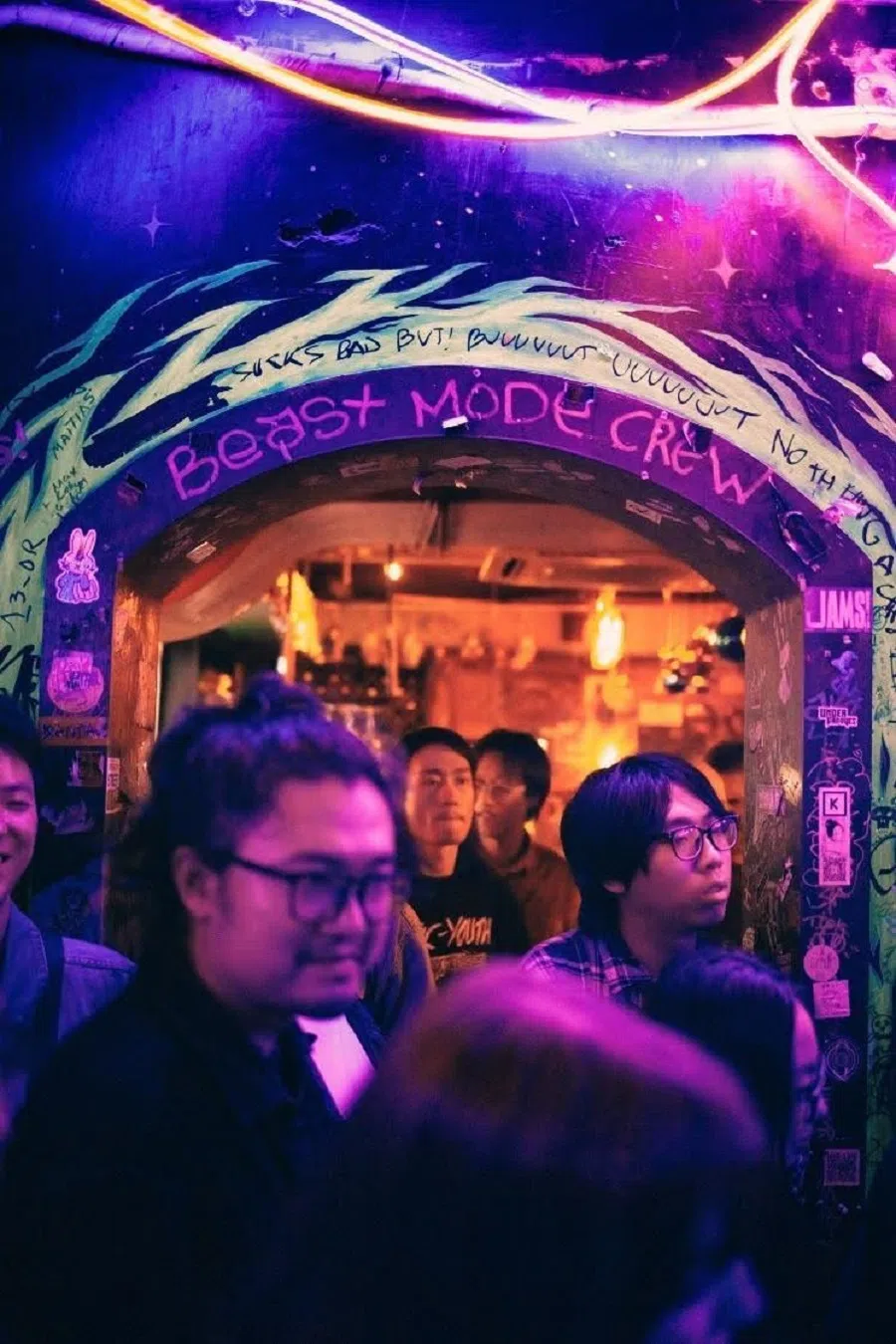The expat bands transforming Shanghai’s independent music scene
It’s all about passion, says Shanghai-based writer Kyle Muntz, for Shanghai bands made up primarily of musicians born outside China. Acts like these are connecting with local audiences and sharing their love of rock, metal, electronica, jazz and much more.

It’s Friday night in Shanghai. After the concert by local alternative punk act Round Eye, Chachy — frontman and founding member — is swarmed by the crowd. He shakes hands, chats, takes a huge gulp of beer as hands pat him on the back. A few faces in the packed, wildly lit underground room are friends or fellow musicians, but most are fans who have seen Round Eye at one of the countless concerts they’ve played in China over the last decade.
“You all are too good, man. The last time I saw you, it was 2017!” says one Chinese fan who approaches Chachy in the hall after the concert. “This guy is the Punk God of Shanghai!”
That night, Round Eye, along with younger metal act Chimera Cult, had played to a packed crowd at C’s bar. But despite headlining some of the biggest live venues in the city, the majority of both band’s members are from outside China, offering a unique opportunity for cultural exchange on both sides.
Amazed by warmth and openness of fans
While both bands play wild, aggressive music — made up of pounding drums, screeching guitars, and screamed or shouted vocals — Round Eye (whose “revolving door” of members hail primarily from the US, with one coming from Ireland) describe their music on their Bandcamp page as “the malformed spawn of doo-wop, punk and free-jazz, seeking to help audiences across the globe ascend into a nirvana of noise, weirdness and sax-powered mayhem. With a psychotic live act that may or may not feature nudity/body paint/destruction/degeneracy this band is not for the faint of heart and not to be missed.”
“In Shanghai they’re more reserved, but in Chengdu they’re wild and crazy. Chongqing, Beijing — it’s a huge country, and everywhere it’s always different vibes.” — Chachy, Frontman and Founding Member, Round Eye

Fortunately, no matter where the band has gone in China, Chachy has been amazed by the warmth and openness of the fans that greeted them. “The audiences are fun, they’re wonderful, and you meet tons of cool people,” Chachy says. “In Shanghai they’re more reserved, but in Chengdu they’re wild and crazy. Chongqing, Beijing — it’s a huge country, and everywhere it’s always different vibes.”
With every city they visit, the bands enrich a flourishing shadow world where the cultural differences of China’s provinces are reflected not just in the fans’ attitude, but also the kind of bands that emerge from local scenes. In Guangzhou, China’s “capital of metalcore”, young metal bands with well-styled hair hop on stage for songs that, in the midst of their violent screams, feature choruses more reminiscent of pop music. Beijing has long been famous for its punk and death metal — an especially violent genre featuring vocals which, to non-fans, sounds like “the cookie monster gurgling over a chainsaw”. In recent years, Chengdu and Chongqing — alongside their famously spicy food — have become notorious for their burgeoning hip hop scenes.
Open-minded audiences
In contrast, Shanghai — a city which draws people and influences from all across China and the world — offers a little bit of everything, with abundant rock and metal shows scattered amidst eclectic genres such as electronica and jazz. But no matter where they go, both bands agree, audiences remain equally open-minded.

For Trey Booth, long-haired “tech nerd” by day and guitarist of Chimera Cult at night, the unique attitude of Chinese audiences is essential kindling for the local scene. “They’re very open-minded, you know? People are open to harder things, more experimental stuff. Whether we’re playing softer songs or harder songs, they just care that the music has soul.”
In their own introduction to their music, also available on Bandcamp, Chimera Cult proclaim that their “eclectic, stream-of-consciousness sound combines everything from brutal death metal, to prog rock, to groove metal… and even good old-fashioned raw punk!” While these genres may sound indistinguishable to outsiders, they’ve all got one thing in common: “Insane high energy self-effacing sonic devastation, leaving no one unscathed!” The result is loud, aggressive music that blends distorted guitar with violently shouted vocals, played by a band whose members include members from Canada, the US and China.
“There’s nothing better than composing something you feel really passionate about, then you see someone out there — lips curled, crossing their arms, nodding their head, just giving you the stink face!” — Trey Booth, Guitarist, Chimera Cult
With Chimera Cult’s rollicking energy on display, audiences don’t just passively watch. “You give the most energy on stage and you get it back,” says Booth. “There’s nothing better than composing something you feel really passionate about, then you see someone out there — lips curled, crossing their arms, nodding their head, just giving you the stink face! Then a bona fide mosh pit starts without you giving any signal!”
‘Local’ bands primarily of musicians born outside China
Tonight’s wild, energetic performance is one of dozens — maybe hundreds — all around China, where a burgeoning alternative music scene has sprung up in “live houses” (the local term for an alternative music venue, presented untranslated in English) even in more remote cities.

Still, Beijing and Shanghai remain the only cities where “local” bands are likely to be made up primarily of musicians born outside China. Much of this results from simple numbers, with more expats living and working in Shanghai than elsewhere, but it also grows naturally out of the city’s abundance of music-themed bars such as Inferno or the newly opened Reaper.
“More places are opening,” says Booth. “Soon, there’s gonna be three metal bars in Shanghai. Most cities don’t even have one — even in the US! And I think that’s a testament to the scene.”
Booth, like many members of both bands, attributes most of his friends to the city’s concerts, jam sessions and community hangouts. Guanxi (social connection) is everything for bands hunting better venues to play, with Round Eye frequently inviting larger international acts to open for. In this way, bands like Round Eye also function as a gateway for bands that would have been unlikely to visit China otherwise — some of whom may attract fans or come back for a second show.
However, for any independent band aiming to reach beyond their own friend group, attracting fans remains the biggest challenge. According to Will Griffith, managing editor of liveCNmusic, the “number one source” in English for information on China’s alternative music scene, the hunt for new ears leads to only one place. “If you want to reach fans in China, you have to use QQ, Weibo, Little Red Book. Otherwise, you’ve got no chance.”
Griffith — a regular sight snapping pictures at concerts around Shanghai — publishes updates on coming shows and writeups on new music by Chinese bands in both English and Chinese. For many years, with its traditional website long abandoned, liveCNmusic has released all its content through a Wechat subscription service.
“It has nothing to do with what you’re singing — plenty of Chinese bands sing in English. But you’ve got to talk to people in their own language.” — Will Griffith, Managing Editor, LiveChinaMusic
“These days, 90% of it is online,” Chachy acknowledges. “But the old-school way of talking and handing out fliers is still effective, because it’s personal. You connect with them. That’s why you go and do events yourself. You hang out with people. That’s how you get to know them.”
Breaking across language barriers
Of course, for Round Eye, Chimera Cult and other bands caught between countries and cultures, language itself is a formidable challenge. “You can’t be using English as your crutch,” Griffith says. “It has nothing to do with what you’re singing — plenty of Chinese bands sing in English. But you’ve got to talk to people in their own language.”

For Chachy, who speaks Chinese with Round Eye fans both onstage and off, this has been the doorway to something special. “I know I’m a foreigner, but I exaggerate it. I make jokes. Once they find out we’re on their turf, it helps them engage and relax. And Chinese is the key.”
“We’re pretty much all teachers,” says Jiang Bo, the American bass player of Roundeye. “We work straight jobs.”
Despite this, both bands still feel there’s more distance to cross when it comes to connecting with audiences. According to one member, it’s possible to feel they’re “put on a pedestal” they haven’t earned yet; on occasion they’ve even been mistaken for famous bands visiting from abroad. Still, with their constant shows and tours, both bands are happy for every new fan who discovers their music through wangiyun (a Spotify-like app which is China’s largest source for streamed music).

Between them, Roundeye and Chimera Cult have toured China, the US, Canada, Europe and Southeast Asia. Despite this, both bands emphasise they’re just normal guys rather than “professional musicians.”
“We’re pretty much all teachers,” says Jiang Bo, the American bass player of Roundeye. “We work straight jobs.”
When asked how much money Chimera cult makes from their music, Jason, lead singer of Chimera Cult (who also performs under the Chinese name Sishen), laughs and says the band is a “pure passion project”.
Still, rather than avoiding the topic, Jason — a muscular, tattooed frontman whose violent barks and prominent biceps are an essential part of the band’s stage presence — perks up. “I teach English. Everybody thinks it’s shameful, but I got no shame. I work at a kindergarten, and I do a good job, and I love it. I chill with the kids all day and I fit right in, because I’m a five-year-old at heart.”

In truth, Griffith suggested, bands like Round Eye and Chimera Cult are rarer than they once were, as many musicians from overseas left during the pandemic. Still, the confidence and ease of tonight’s show is a sign of the resurgent ease of the post-pandemic era — though filling a room remains only part of the challenge.
The only life they know
“Some bands go viral,” Griffith explains. “A few even sign to Chinese labels or switch to touring full time — but not with music like this.” Still, working in obscurity is nothing new to members of both bands, all of whom mentioned playing in local bands before relocating to China, most while working full-time jobs.
“It’s the same for local musicians everywhere, including in China,” Griffith said. “They pay the bills selling guitars at music stores, or a bunch of them work in offices and use practice to vent in the evenings.”
Still, despite the challenges, both bands agree there’s nowhere they’d rather be. “The scene in China is fair, as long as you’re willing to live it,” Griffith says. “These days, you’ve got a lot more bands that are half foreigners, half Chinese. Basically, everybody is just helping the scene grow.”
But if it isn’t about money or getting famous, what drives them?
“For these guys, it’s the only life they know,” says Griffith. “If music is your life, you’ll find a way to play it — no matter where you’re at.”





